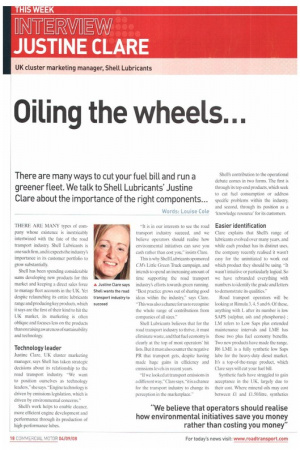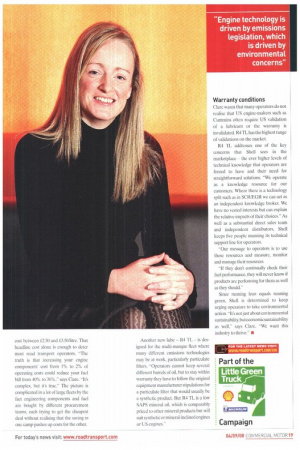Oiling the wheels...
Page 18

Page 19

If you've noticed an error in this article please click here to report it so we can fix it.
There are many ways to cut your fuel. bill and run a greener fleet. We talk to Shell Lubricants' Justine Clare about the importance of the right components...
Words: Louise Cole THERE ARE MANY types of company whose existence is inextricably intertwined with the fate of the road transport industry. Shell Lubricants is one such firm, and it expects the industry's importance in its customer portfolio to grow substantially.
Shell has been spending considerable sums developing new products for this market and keeping a direct sales force to manage fleet accounts in the UK. Yet despite relaunching its entire lubricants range and producing key products. which it says are the first of their kind to hit the UK market, its marketing is often oblique and focuses less on the products than on raising awareness of sustainability and technology.
Technology leader Justine Clare, UK cluster marketing manager, says Shell has taken strategic decisions about its relationship to the road transport industry. "We want to position ourselves as technology leaders," she says. "Engine technology is driven by emissions legislation, which is driven by environmental concerns."
Shell's work helps to enable cleaner. more efficient engine development and performance through its production of high-performance tubes. "It is in our interests to see the road transport industry succeed, and we believe operators should realise how environmental initiatives can save you cash rather than cost you," insists Clare.
This is why Shell Lubricants sponsored CM's Little Green Truck campaign, and intends to spend an increasing amount of time supporting the road transport industry's efforts towards green running. "Best practice grows out of sharing good ideas within the industry," says Clare. "This was also a chance for us to recognise the whole range of contributions from companies of all sizes."
Shell Lubricants believes that for the road transport industry to thrive, it must eliminate waste, and that fuel economy is clearly at the top of most operators' hit lists. But it must also counter the negative PR that transport gets, despite having made huge gains in efficiency and emissions levels in recent years.
"If we looked at transport emissions in a different way," Clare says, "it is a chance for the transport industry to change its perception in the marketplace." Shell's contribution to the operational debate comes in two forms. The first is through its top-end products, which seek to cut fuel consumption or address specific problems within the industry, and second, through its position as a 'knowledge resource' for its customers.
Easier identification Clare explains that Shell's range of lubricants evolved over many years, and while each product has its distinct uses, the company recently realised it wasn't easy for the uninitiated to work out which product they should be using. "It wasn't intuitive or particularly logical. So we have rebranded everything with numbers to identify the grade and letters to demonstrate its qualities."
Road transport operators will be looking at Rimula 3.4. 5 and 6. Of these, anything with L after its number is low SAPS (sulphur, ash and phosphorus) ; LM refers to Low Saps plus extended maintenance intervals and LME has those two plus fuel economy benefits. Two new products have made the range. R6 LME is a fully synthetic low Saps lube for the heavy-duty diesel market. It's a top-of-the-range product, which Clare says will cut your fuel bill.
Synthetic fuels have struggled to gain acceptance in the UK, largely due to their cost Where mineral oils may cost between £1 and £1.50/litre, synthetics
cost between £2.50 and 0.50/litre. That headline cost alone is enough to deter most road transport operators. "The truth is that increasing your engine components cost from 1% to 2% of operating costs could reduce your fuel bill from 40% to 36%," says Clare. -Ifs complex, but it's true." The picture is complicated in a lot of large fleets by the fact engineering components and fuel are bought by different procurement teams, each trying to get the cheapest deal without realising that the saving in one camp pushes up costs for the other. Another new lube R4 TL is designed for the multi-marque fleet where many different emissions technologies may be at work, particularly particulate filters. "Operators cannot keep several different barrels of oil, but to stay within warranty they have to follow the original equipment manufacturer stipulations for a particulate filter that would usually be a synthetic product. But R4 TL is a low SAPS mineral oil, which is comparably priced to other mineral products but will suit synthetic or mineral-inclined engines or US engines." Warranty conditions Clare warns that many operators do not realise that US engine-makers such as Cummins often require US validation of a lubricant or the warranty is invalidated. R4 TL has the highest range of validations on the market.
R4 TL addresses one of the key concerns that Shell sees in the marketplace the ever higher levels of technical knowledge that operators are forced to have and their need for straightforward solutions. "We operate as a knowledge resource for our customers. Where there is a technology split such as in SCRJEGR we can act as an independent knowledge broker. We have no vested interests but can explain the relative impacts of their choices." As well as a substantial direct sales team and independent distributors, Shell keeps five people manning its technical support line for operators.
"Our message to operators is to use these resources and measure. monitor and manage their resources.
-If they don't continually check their fuel performance, they will never know if products are performing for them as well as they should."
Since running lean equals running green, Shell is determined to keep urging operators to take environmental action. "It's not just about environmental sustainability, but economicsustainability as well," says Clare. "We want this industry to thrive." •




































































































































































